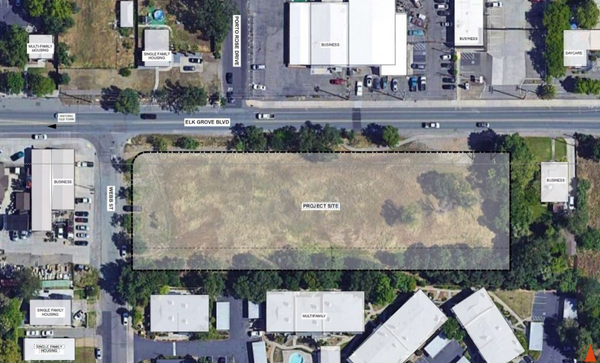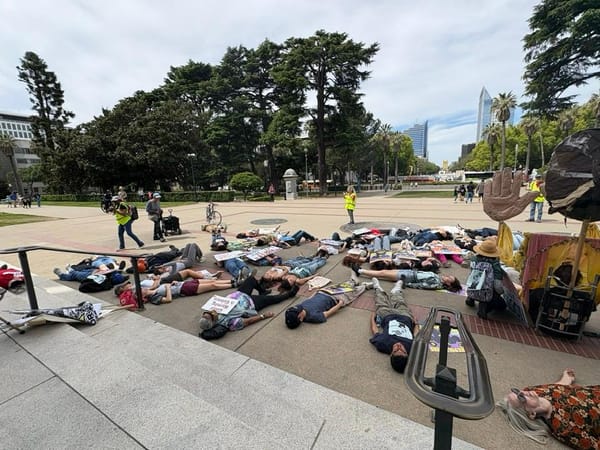Governor Newsom signs healthy and safety setbacks, carbon capture and other climate bills
VALLEJO, CA – With multiple oil refineries of the East Bay’s “Refinery Corridor” looming in the distance,” California Governor Gavin Newsom signed into law a bill that will require 3,200-foot setbacks between oil and gas drilling and homes, schools and other sensitive receptors in California.
The Governor signed the legislation, SB 1137, as part of a package of climate bills alongside legislative leaders at the USDA Forest Service Region Headquarters at Mare Island, a facility powered by clean energy that also feeds the grid.
Standing in front of the new solar array at the headquarters, Newsom made a “historic commitment to end California’s dark legacy of urban oil extraction that overwhelmingly impacts non-white and low-income communities,” reported Voices in Solidarity Against Oil in Neighborhoods (VISION), the coalition of environmental justice groups that campaigned for the legislation, in a statement.
The bill was part of what the Governor described as a “ sweeping package of legislation to cut pollution, protect Californians from big polluters, and accelerate the state’s transition to clean energy.”
“This month has been a wake-up call for all of us that later is too late to act on climate change. California isn’t waiting any more,” said Governor Newsom. “Together with the Legislature, California is taking the most aggressive action on climate our nation has ever seen. We’re cleaning the air we breathe, holding the big polluters accountable, and ushering in a new era for clean energy. That’s climate action done the California Way – and we’re not only doubling down, we’re just getting started.”
Newsom said he teamed up with legislative leaders this session to advance a climate package to “achieve carbon neutrality no later than 2045 and 90% clean energy by 2035, establish new setback measures protecting communities from oil drilling, capture carbon pollution from the air, advance nature-based solutions, and more.”
Environmental justice and climate groups applauded the Governor’s signing of SB 1137 for mandating the most extensive health and safety setbacks in the nation — after decades of California requiring no buffer zones around oil and gas wells. At the same time, Food and Water Watch and other organizations condemned the passage of one of the bills in the package, SB 905, that fast tracks the controversial practice of “carbon capture. “
“A history of housing discrimination and redlining in the state made neighborhood oil drilling one of the clearest examples of environmental racism in California,” the VISION Coalition said in a statement addressing the passage of SB 1137. “This new law will not only prohibit new drilling within the setback zone but will apply stringent pollution controls to operators and further prohibit them from reworking existing wells–essentially phasing out all operations within the setback zone over the coming years.”
VISION said the “overwhelming body of evidence” shows that proximity to industrial fossil fuel operations increases exposure to known carcinogens and endocrine disruptors, fine and ultra-fine particulate matter that can shorten life expectancy, cause birth complications and increase risks for cancer, asthma and other respiratory illnesses.
Over the last decade, frontline communities have led the movement calling on local and state legislators to establish a buffer zone between toxic oil wells and their homes, schools, parks and workplaces, according to the coalition, according to VISION.
“Four years ago, the small city of Arvin in Kern County made history passing the state’s first local setback ordinance of 300ft.,” said Nayamin Martinez, Executive Director, Central California Environmental Justice Network. “Today, the same communities that fought for Arvin’s protective setbacks carried the fight to the finish line and celebrated the passage of 3,200ft setbacks statewide. While we know this distance is just the bare minimum needed to protect our communities, we are proud of our environmental justice communities that paved the way for this historic victory.”
“California’s politicians have finally listened. We’re glad the legislature and the Governor have at last taken necessary action for setbacks,” said Dr. Catherine Garoupa White, Executive Director, Central Valley Air Quality Coalition. “Today’s monumental win belongs to frontline communities who’ve been fighting for setbacks for years, and it’s a big indicator that the tide is turning on Big Oil in Sacramento.
In October 2021, Gov. Newsom announced that the Geologic Energy Management Division (CalGEM), the state’s oil and gas regulator, had released a proposed regulation that would prohibit new wells and facilities within 3,200 feet of communities. “Environmental justice advocates and frontline community members were deeply engaged in the agency’s rulemaking process for years but doubtful that the troubled regulator, with a history of financial ties to the fossil fuel industry, would move at the speed required to address the ongoing threat of neighborhood drilling,” VISION stated.
“But an end-of-session proposal by Gov. Newsom to include setbacks in a suite of climate priorities led Sens. Lena Gonzalez (D-Long Beach) and Monique Limón (D-Santa Barbara) to carry SB 1137 across the finish line this legislative session. Although two similar bills had previously died in the legislature, senate and assembly champions worked hard to secure the votes this round and Gov. Newsom also visited the Capitol speaking to Dems in both chambers with a plea for setbacks,” the coalition continued.
“This legislation marks a true turning point in California’s history and in our nation’s fight against climate change and decade’s worth of environmental injustices faced by our frontline communities. Our planet is warming, and that is simply an undeniable truth; but with bold actions like SB 1137 we can still catch up in the race to stop this crisis,” said Senator Lena Gonzalez (D-Long Beach). “With the combined stress of global warming and proximity to oil and gas production wells, it is our frontline communities that carry the heaviest burden with their already increased risk of asthma, heart disease and cancer. That is the reality and the severity of the public health challenges that pollution-burdened communities face daily across our state, and SB 1137 will help us change that. This is only the beginning—I believe SB 1137 will be a catalyst for more meaningful climate action in the near future.:
The group said the effects of climate change “have never been more apparent” across California with deadly heat, drought and extreme fires threatening a livable future in the state.
“Today’s historic bill signing will personally impact the lives of 3 million Californians living within 3,200 feet of toxic oil operations. It also marks a decisive step toward phasing out the worst and dirtiest fossil fuels on the path to the Governor’s goal of a complete phase out of in-state fossil fuel operations. Alongside the unprecedented investments in regional economic development to create good, sustainable, family supporting union jobs, as well as programs targeted to support displaced oil workers, California takes a definitive step toward a future beyond oil,” VISION remarked.
Dan Ress, Staff Attorney, Center on Race, Poverty and the Environment, commented, “Finally, after years and years of environmental justice communities fighting for comprehensive public health setbacks, the legislature and the Governor are taking action,” said”Today, California is committing in statute to phase out the scourge of neighborhood drilling in our communities. The signing of SB 1137 into law is not only historic–it will save lives.”
“The signing of SB 1137 is a historic moment not just in California history, but for the incredible visionary leadership of the environmental justice movement worldwide,” concluded Kobi Naseck, Coalition Coordinator, Voices in Solidarity Against Oil in Neighborhoods. “By signing the bill into law, the Governor is beginning to put an end to the harm that Big Oil has inflicted on our state’s frontline communities for decades. VISIÓN is grateful for the Governor’s signature, and for the support of our advocates in the legislature, Senator Gonzalez and Senator Limón, who carried this bill and the multi-year campaign behind it over the finish line.”
While calling the signing of AB 1137 into law today as “unquestionably historic and necessary,” Food and Water Watch California slammed the carbon capture bill, SB 905, as “unconscionable.”
“After congressional investigations revealed major fossil fuel companies have used carbon capture to ensure continued oil and gas production, Governor Gavin Newsom signed into law a bill fast-tracking the practice as part of his climate package,” the group said in a statement. “SB 905 would officially establish a carbon capture, utilization and storage (CCUS) program for California and streamline the permitting process for applicants. Environmental advocates have criticized carbon capture technology as expensive, unproven and a lifeline to the fossil fuel industry.
In a memo released Thursday to the House Oversight Committee, Representatives Carolyn B. Maloney (D-NY) and Ro Khanna (D-CA) outlined the documented memos and conversations of industry giants like BP pinning their hopes on carbon capture “to enable the full use of fossil fuels across the energy transition and beyond.” The memo also documents the intentionally false statements made by fossil fuel interests to present CCS technology as more reliable and successful than it currently is.
“It looks like Newsom fell for Big Oil’s big lies,” said Food & Water Watch California Director Chirag G. Bhakta after the bill signing. “Carbon capture is a smokescreen for fossil fuel industry players to protect their bottom lines at the expense of our climate and communities. Newsom should be slashing emissions by cutting off fossil fuel permits and taking us away from fossil fuels. Instead, he’s letting oil and gas companies dictate California’s climate action. It’s an irresponsible and dangerous choice.”
Bhakta noted that carbon capture “remains largely unsuccessful,” and the few successful endeavors have required enormous public subsidies to function. Meanwhile, the profits of fossil fuel companies investing in CCS continue to rise.
“Signing health and safety setbacks into law is unquestionably historic and necessary,” Bhakta continued. “Passing a law that serves as a lifeboat to fossil fuel companies at the same time is unconscionable. It’s up to the California Air Resources Board to deny these foolish schemes and focus on transitioning away from fossil fuel.”
Even when not used for enhanced oil recovery, the group said carbon capture can lead to increased emissions. Food & Water Watch research reveals that even if all power plants used CCS technology, they would burn 39 percent more natural gas and 43 percent more coal.
The oil and gas industry, which fiercely opposed SB 1137 and other bills in the package, accused the Governor of signing legislation that would have “tremendous costs and impacts” on Californians.
Western States Petroleum Association (WSPA) President and CEO Catherine Reheis-Boyd, the former Chair of the Marine Life Protection Act (MLPA) Initiative to create “marine protected areas” in Southern California, blasted the signing of the Governor’s climate bills package in a statement:
“What will be ‘historic’ about the package of bills signed by the Governor today will be the tremendous costs and impacts they will impose on California residents, our economy and our way of life. The Governor’s actions are meant to eliminate oil production and associated jobs in California, make us dependent on other countries for our fuels, dictate how and when we can travel and mandate the energy we use.”
“We are here to work on better ways to meet our important climate goals without bans, mandates and forcing all Californians into one form of energy.”
The climate package signed today includes:
- CARBON NEUTRALITY: AB 1279 by Assemlymembers Al Muratsuchi (D-Torrance) and Cristina Garcia (D-Bell Gardens) codifies the statewide carbon neutrality goal to dramatically reduce climate pollution.
- Establishes a clear, legally binding, and achievable goal for California to achieve statewide carbon neutrality as soon as possible, and no later than 2045, and establishes an 85% emissions reduction target as part of that goal.
- PROTECT COMMUNITIES AGAINST OIL DRILLING: SB 1137 by Senators Lena Gonzalez (D-Long Beach) and Monique Limón (D-Santa Barbara) protects communities from the harmful impacts of the oil industry.
- Establishes a setback distance of 3,200 feet between any new oil well and homes, schools, parks or businesses open to the public.
- Ensures comprehensive pollution controls for existing oil wells within 3,200 feet of these facilities.
- 100% CLEAN ELECTRIC GRID: SB 1020 by Senator John Laird (D-Santa Cruz) establishes a pathway toward the state’s clean energy future.
- Creates clean electricity targets of 90% by 2035 and 95% by 2040 with the intent of advancing the state’s trajectory to the existing 100% clean electricity retail sales by 2045 goal.
- CAPTURING AND REMOVING CARBON POLLUTION: SB 905 by Senators Anna Caballero (D-Merced) and Nancy Skinner (D-Berkeley) and SB 1314 by Senator Monique Limón (D-Santa Barbara) advance engineered technologies to remove carbon pollution, while banning the use of those technologies for enhanced oil recovery.
- Establishes a clear regulatory framework for carbon removal and carbon capture, utilization and sequestration.
- Bans the practice of injecting carbon dioxide for the purpose of enhanced oil recovery.
- NATURE-BASED SOLUTIONS: AB 1757 by Assemblymembers Cristina Garcia (D-Bell Gardens) and Robert Rivas (D-Salinas) enlists nature in the state’s climate agenda.
- Requires the state to develop an achievable carbon removal target for natural and working lands
For full text of the bills, visit: http://leginfo.legislature.ca.gov.



